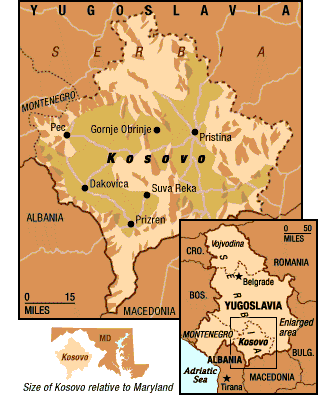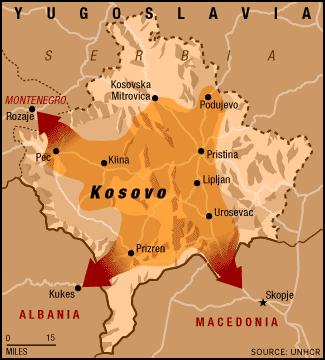
Status Quo Side: Yugoslav/Serbian government
Non-Status Quo Side: Kosovar Albanians and NATO
Region: Europe
Conflict Type: External Intervention
Issues in Dispute: Ethnic, Governance, Independence
Maps: [Kosovo maps]
[Ancient boundaries of Serbia]
[Greater Albania - Ottoman Valayets c.1878]
[20th century boundaries of Serbia]
[Ethnic distribution in Yugoslavia]
[Serb religious sites in Kosovo]
[July 1998 situation map showing refugees and KLA
resistance zone]
Phase I, which is not coded, begins in Kosovo in 1389 with the Battle of the Field of Blackbirds in which Turkish forces defeated the Serb forces, creating a memory for Orthodox Serbs that translated into a historic animosity toward Balkan Muslims, notably the Kosovar Albanians, who had been converted to Islam by the Ottomans. In the 1912-13 Balkans War, Serbia retook Kosovo from the Turks.
After devastating defeats, Serbia was occupied by Austria for most of WWI. With the creation of Yugoslavia in the peace treaties of 1919, the Serbs emerged as the dominant group in an enlarged, multi-ethnic state. Yugoslavia was crushed by the German invasion in 1941. Kosovo was brutally occupied by the Skanderberg SS Division recruited in neighboring Albania.
Following WWII, communist resistance leader Marshal Josip Broz Tito's, who emerged as the dictator of Yugoslavia, retained Kosovo as a province of Serbia within the Yugoslav state. In 1974 Tito instituted a new Yugoslav constitution granting Kosovo autonomous status. Ethnic Albanian Muslims, with the highest birth rate in Europe, were becoming the majority in Kosovo. Albanian nationalism flourished, with the Albanian national flag flown, Albanian language taught in schools instead of Serbo-Croation used elsewhere in Yugoslavia, and ethnic Albanians controlling access to jobs in the socialist state. After Tito's death in 1980, the Albanian nationalists seeking independence for Kosovo clashed with Serb police forces.
In 1989, newly installed Serbian President Slobodan Milosovich revoked Kosovo autonomy and promised Kosovo Serbs that they would be restored to power. In 1990, Milosovich dissolved the provincial government and sent in troops. Ethnic Albanian Muslims, now constituting 90% of the population in Kosovo, rebelled against the increasingly brutal rule by Serb police. In 1991, Kosovar separatists declared a republic, receiving recognition from neighboring Albania, and electing pacifist Ibrahim Rugova as president the following year.
The US-hosted Dayton agreement in 1995 ended the war over Bosnia and elicited a short-lived Milosovich promise to respect the rights of the Kosovars. The Democratic League of Kosovo, led by pacifist Ibrahim Rugova, and the Kosovo Liberation Army (KLA) called for independence, with the latter launching assaults on Serbian officials and Albanian collaborators, resulting in more than 50 deaths.
In March 1998, Serbian police conducted raids against civilians suspected of harboring KLA rebels. The UN Security Council responded with an arms embargo against Yugoslavia. The clashes continued and many Kosovars fled the country. By late 1998 a quarter million refugees had been driven out. On October 13, U.S. special envoy Richard C. Holbrooke negotiated a cease-fire, but reports of Serb massacres of Albanian Kosovars continued.
In February 1999, at a conference at Rambouillet, France, the allies, after an unsatisfactory experience with UNPROFOR in Bosnia, pressed for a NATO peacekeeping force. Although Albanian representatives accepted, Milosovich refused, seeing the NATO proposal as tantamount to ceding Kosovo and accepting indefinite NATO occupation of Serbia.
 NATO air strikes against Serbia and
Kosovo began on March 24, 1999. At the same time, Serbia began a long planned, massive
military assault on KLA forces and civilian cites and towns with KLA sympathies. The
Serb assault immediately forced hundreds of thousands of Kosovars to flee across the
borders to Albania, FYR Macedonia and Montenegro. Ultimately over 800,000 Kosovars sought
refuge in neighboring territories, creating the largest forced deportation in Europe since
World War II and straining humanitarian relief organizations ability to respond.
NATO air strikes against Serbia and
Kosovo began on March 24, 1999. At the same time, Serbia began a long planned, massive
military assault on KLA forces and civilian cites and towns with KLA sympathies. The
Serb assault immediately forced hundreds of thousands of Kosovars to flee across the
borders to Albania, FYR Macedonia and Montenegro. Ultimately over 800,000 Kosovars sought
refuge in neighboring territories, creating the largest forced deportation in Europe since
World War II and straining humanitarian relief organizations ability to respond.
NATO planes were kept three miles in the air to avoid allied casualties. Russia and China protested NATO's bombing, and other fissures developed between the coalition as ground war planning started. In May, Milosovich was indicted by the international war crimes tribunal for Yugoslavia, and in June fighting stopped and KFOR began policing Kosovo, with a slowly-filled complement of UN police and administrators. By 2000 it remained unclear whether the ethnic conflict there could be pacified, how long external forces would have to remain, and what the future political status would be.